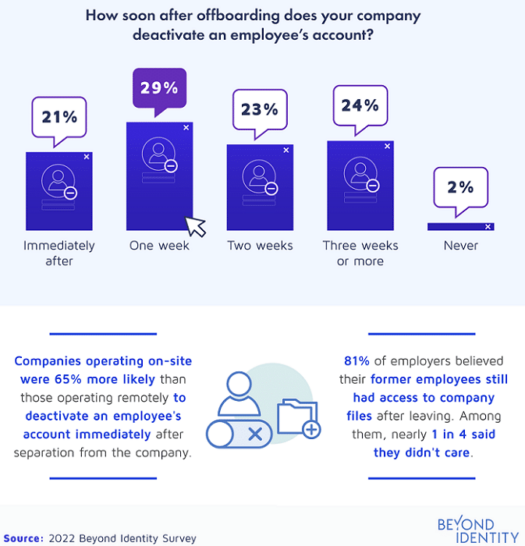Small-biz tip: Don't overlook this digital danger

Are you the type of business owner who forgets about ex-employees as soon as they’re gone? Failing to remove former employees’ access to your systems and data could lead to security breaches. Don’t let poor offboarding practices be the weak link in your cybersecurity chain.
How improper offboarding can hurt your business
Whenever an employee leaves the organization, you must remove their access to company systems and data. That’s especially true if you’ve laid off an employee. They may feel a sense of anger or resentment towards the company, which makes them more likely to be malicious.
It’s more common than you might think. A recent study from Beyond Identity examined how ineffective offboarding impacts a business’ cybersecurity. They found that one in three employers has been hacked due to ineffective offboarding.
Oh, and most former employees say they can still access company files. Researchers say 91% of employees can still see private files after offboarding earlier last year. Do you want former employees to know what you’re doing a year later? Probably not!
Plus, the study found only 21% of employers deactivated an employee’s account immediately after they let the worker go. It took 29% a whole week to cut the strings.

Overall, businesses estimated they lost $7,687 to ineffective offboarding. In other words, it’s a mistake you can’t afford to make. Want to build better business practices? Here are the three lessons Kim has for fellow business owners.
Offboarding dangers for small-business owners
⚠️ If you don’t completely cut off former employees, you’re taking on a ton of risks, like:
- Insider threats: Former employees who can still access company systems and data can steal confidential information or sabotage your systems.
- Social engineering: I talk a lot about how dangerous phishing scams are. They can level a company’s computer systems. Former employees are especially dangerous because they know social details about the workplace, which can help them access sensitive information or networks.
- Revenge: In some cases, fired employees may attempt to cause harm to their former employer out of revenge, such as launching a denial-of-service attack or spreading false information about the company.
Beyond Identity’s survey found that 86% of employees have considered taking negative actions against a former employer. People who actually went through with retaliation had diverse reasons: 37% said they didn’t get a raise, while 29% cited a bad relationship.
Don't make the same mistake that cost me $90K

I’ve been a small business owner for 25 years. Along the way, I’ve had some great successes, along with my fair share of mistakes.
Sometimes those mistakes are easy to recover from. You recognize what went wrong, regroup and try something new. And sometimes you realize, “Uh oh. This is something I can never let happen again.”
